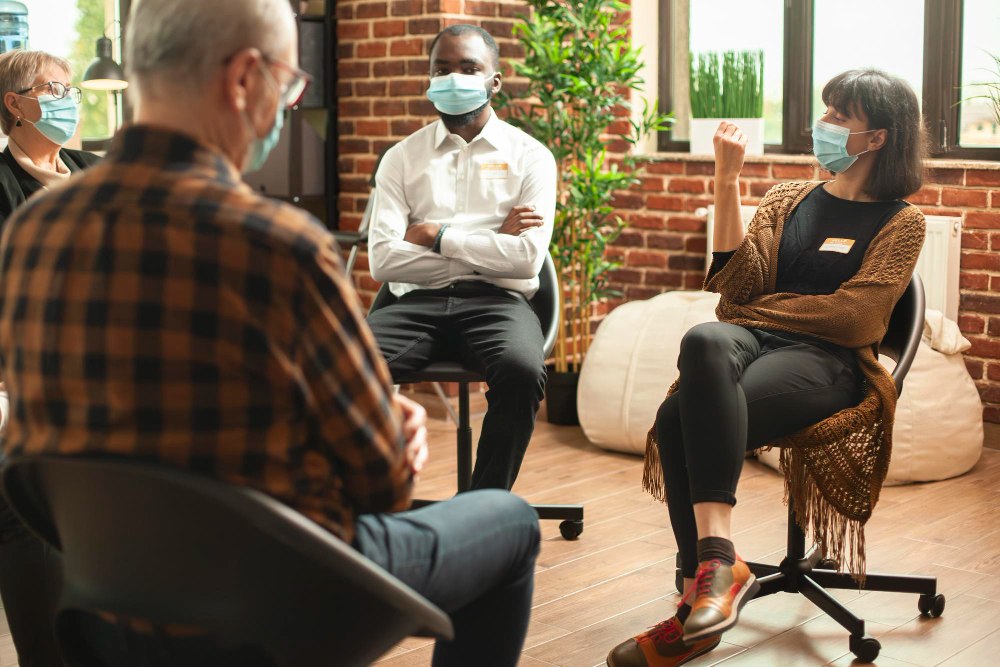Post-traumatic stress disorder (PTSD) is a debilitating mental health condition that can develop after experiencing or witnessing a traumatic event. While often associated with military combat, PTSD can stem from a variety of distressing occurrences, including abuse, accidents, and natural disasters. It affects a person’s emotional, cognitive, and physical well-being, making daily life challenging.
At Foundations Group Behavioral Health, we provide comprehensive Post-Traumatic Stress Disorder Treatment Programs (PTSD Treatment Programs), Psychiatric Day Treatment, Half-Day Treatment Programs, and Outpatient Mental Health Programs to help individuals struggling with PTSD. Understanding the causes of PTSD is the first step in recognizing symptoms and seeking appropriate treatment.
What is PTSD?
PTSD is a mental health disorder triggered by trauma. The condition affects how the brain processes fear and stress, leading to heightened emotional responses and difficulty regulating thoughts and feelings. Symptoms can emerge immediately after a traumatic event or surface months or even years later.
Symptoms of PTSD
PTSD symptoms fall into four main categories:
- Intrusive Thoughts:
- Recurrent distressing memories or nightmares.
- Flashbacks where the individual feels as if they are reliving the trauma.
- Avoidance:
- Avoiding places, people, or situations that remind them of the traumatic event.
- Emotional numbness or detachment from loved ones.
- Negative Changes in Thinking and Mood:
- Persistent negative thoughts about oneself or others.
- Feelings of guilt, shame, or hopelessness.
- Heightened Arousal and Reactivity:
- Being easily startled or always on high alert.
- Irritability, difficulty concentrating, and trouble sleeping.
PTSD is more than just “bad memories”—it is a serious condition that can interfere with a person’s ability to function in everyday life. Fortunately, treatment is available through PTSD Treatment Programs and other Mental Health Treatment Programs designed to address trauma and its long-term effects.
6 Common Causes of PTSD
While PTSD can develop after any traumatic experience, the following are among the most common causes:
1. Military Combat and War
Combat-related PTSD is well-documented among veterans and active-duty service members. Exposure to violence, life-threatening situations, and the loss of fellow soldiers can have lasting psychological effects.
- 15-20% of military veterans experience PTSD.
- Many veterans also struggle with co-occurring disorders, such as anxiety, depression, and substance use disorders.
Programs such as Co-Occurring Disorder Treatment Programs and PTSD Treatment Programs are crucial for military personnel adjusting to civilian life.
2. Physical or Sexual Assault
Survivors of physical and sexual assault often experience profound emotional and psychological distress, leading to PTSD.
- 94% of women who experience sexual assault develop PTSD symptoms within two weeks.
- Victims of domestic violence are at high risk for chronic PTSD, with symptoms lasting years if untreated.
Treatment programs, including Psychiatric Day Treatment and Outpatient Mental Health Programs, provide therapy and coping strategies to help survivors reclaim their sense of safety and empowerment.
3. Serious Accidents and Injuries
PTSD is common among survivors of car accidents, workplace injuries, and other life-threatening incidents.
- 9% of accident survivors develop PTSD.
- People with serious injuries often experience flashbacks, survivor’s guilt, and heightened anxiety.
Programs such as Post-Traumatic Stress Disorder Treatment Programs and Anxiety Treatment Programs can help survivors process their trauma and rebuild their confidence.
4. Childhood Abuse and Neglect
Children who grow up in environments with emotional, physical, or sexual abuse often develop PTSD, sometimes manifesting years later in adulthood.
- Childhood trauma increases the risk of anxiety, depression, and substance use disorders.
- Without treatment, PTSD from early-life trauma can lead to difficulty forming relationships and regulating emotions.
Half-Day Treatment Programs and Outpatient Mental Health Programs offer long-term support for those healing from childhood trauma.
5. Natural Disasters
Hurricanes, earthquakes, fires, and floods can be extremely traumatic, particularly for those who experience displacement, loss of loved ones, or injury.
- 30-40% of disaster survivors develop PTSD symptoms.
- First responders are at increased risk of PTSD due to repeated exposure to high-stress rescue situations.
Treatment through PTSD Treatment Programs and Mental Health Treatment Programs helps individuals process these traumatic experiences and build resilience.
6. Sudden Loss of a Loved One
Losing a loved one unexpectedly—whether due to illness, suicide, or an accident—can cause prolonged emotional distress and, in some cases, PTSD.
- Grief-related PTSD can cause avoidance behaviors, persistent sadness, and difficulty returning to daily life.
- People experiencing Prolonged Grief Disorder (PGD) often benefit from Depressive Disorder Treatment Programs and grief counseling.

How PTSD is Treated
PTSD is treatable, but it requires a comprehensive approach that includes therapy, medication, and supportive care.
1. Psychiatric Day Treatment
- Intensive therapy for those struggling with severe PTSD symptoms.
- Medication management for individuals who need additional support.
- Structured coping strategies to regain control over daily life.
2. Half-Day Treatment Program
- Offers flexibility for individuals balancing work, school, or family life.
- Teaches mindfulness and relaxation techniques to reduce hypervigilance.
- Trauma-informed group therapy provides peer support and healing.
3. Outpatient Mental Health Program
- Weekly therapy sessions to address PTSD triggers.
- Medication-assisted treatment (MAT) when needed.
- Long-term coping strategies for continued progress.
4. PTSD Treatment Program
- Cognitive Behavioral Therapy (CBT): Helps individuals change harmful thought patterns.
- Eye Movement Desensitization and Reprocessing (EMDR): A technique that helps reprocess traumatic memories.
- Dialectical Behavior Therapy (DBT): Teaches emotional regulation and distress tolerance.
The Role of Family and Support Systems in PTSD Recovery
Healing from PTSD is not a solitary journey—family, friends, and support networks play a crucial role in a person’s recovery.
How Loved Ones Can Help:
- Encourage Professional Treatment: Help the individual seek a PTSD Treatment Program or Psychiatric Day Treatment.
- Be Patient and Supportive: Understand that recovery takes time and requires empathy.
- Learn About PTSD: Educating yourself about the condition can improve communication and strengthen relationships.
- Promote Healthy Coping Mechanisms: Encourage mindfulness, exercise, and social engagement.
Family therapy, available through Outpatient Mental Health Programs, can help bridge the gap between individuals and their loved ones, promoting healing for everyone involved.
Seeking Help for PTSD at Foundations Group Behavioral Health
Living with PTSD can be overwhelming, but you are not alone. At Foundations Group Behavioral Health, we offer tailored treatment programs designed to meet each individual’s unique needs. Our services include:
- Psychiatric Day Treatment
- Half-Day Treatment Programs
- Outpatient Mental Health Programs
- PTSD Treatment Program
- Co-Occurring Disorder Treatment Program
If you or a loved one is struggling with PTSD, call us today at 888.685.9730 to learn more about our trauma-focused treatment options. Your healing journey starts now.
Conclusion
PTSD is a challenging and often life-altering condition, but it is treatable with the right support and interventions. Whether the trauma stems from combat, assault, accidents, childhood abuse, natural disasters, or the loss of a loved one, healing is possible. Recognizing the signs of PTSD and understanding its causes are crucial first steps toward seeking help.
At Foundations Group Behavioral Health, we provide comprehensive PTSD treatment programs tailored to meet each individual’s unique needs. Through Psychiatric Day Treatment, Half-Day Treatment Programs, Outpatient Mental Health Programs, and specialized PTSD Treatment Programs, we help individuals regain control over their emotions, rebuild resilience, and develop effective coping strategies.
No one should have to navigate PTSD alone. Whether you’re personally experiencing PTSD or supporting a loved one, professional treatment can make a significant difference. If you or someone you know is struggling, don’t wait—help is available. Call us today at 888.685.9730 to learn more about our trauma-focused treatment options and take the first step toward recovery.
FAQ on PTSD
What is PTSD?
PTSD (Post-Traumatic Stress Disorder) is a mental health condition that occurs after experiencing or witnessing a traumatic event. It can cause intrusive memories, emotional distress, and difficulty functioning in daily life.
What are the common causes of PTSD?
PTSD can be triggered by various traumatic events, including:
- Military combat and war
- Physical or sexual assault
- Serious accidents or injuries
- Childhood abuse and neglect
- Natural disasters
- The sudden loss of a loved one
How do I know if I have PTSD?
Common symptoms include flashbacks, nightmares, emotional numbness, avoidance of trauma reminders, heightened anxiety, irritability, and difficulty concentrating. If these symptoms persist and interfere with daily life, professional treatment may be necessary.
Can PTSD go away on its own?
While some individuals may recover over time, many need professional help to manage their symptoms. PTSD can become chronic without proper treatment, making therapy and support programs essential for long-term recovery.
What treatment options are available for PTSD?
Treatment options include:
- PTSD Treatment Programs
- Psychiatric Day Treatment
- Half-Day Treatment Programs
- Outpatient Mental Health Programs
- Cognitive Behavioral Therapy (CBT) and EMDR Therapy
- Medication management for symptom relief
What is the best therapy for PTSD?
Evidence-based therapies such as Cognitive Behavioral Therapy (CBT), Eye Movement Desensitization and Reprocessing (EMDR), and Dialectical Behavior Therapy (DBT) have been shown to be highly effective in treating PTSD.
Can PTSD be treated without medication?
Yes, therapy alone can be effective for some individuals. However, in severe cases, medication may be recommended alongside therapy to help regulate mood, anxiety, and sleep disturbances.








